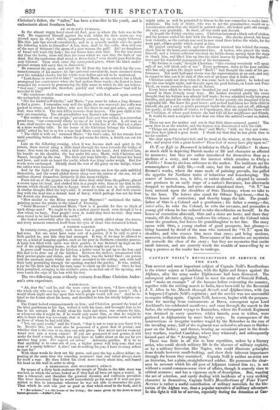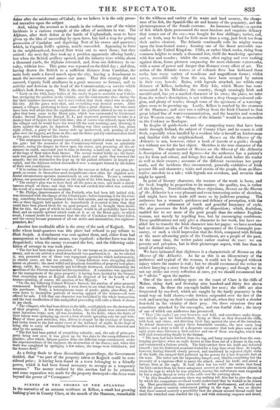CAPTAIN NEILL ' S RECOLLECTIONS OP SERVICE IN THE EAST.
THE newest and most important subject of Captain Neil's Recollections is the winter sojurn at Candahar' with the fights and forays against the Afghans, after the army under Elphinstone had been destroyed. The subsequent advance against Cabul to meet the army of General Pollock, and " make an example " of the bazaars before evacuating the country, together with the retiring march to India, have been told by the Reverend J. N. Allen in his March through Seinde and Afghanistan, with (as it happens) Captain Neill's regiment ; and the service was too uneventful to require telling again. Captain Neill, however, begins with the prepara- tions for moving from cantonments at Deesa, consequent upon Lord Auckland's too celebrated manifesto ; and runs through the march to the Indus, the subsequent voyage to Kurrachee, where the Fortieth Regiment was detained in sorry quarters, whilst laurels, soon to wither, were gathered in Afghanistan by more lucky corps. In consequence of the insurrections or irregular warfare waged by the Belooches in the rear of the invading army, half of the regiment was ordered to advance to Shirka- poor on the Indus ; and thence, bearing an occasional part in the desul- tory warfare, reached Candahar, where they wintered; and subsequently formed part of the " Avenging Army."
There was little in all this to bear repetition, unless by a literary artist, who could sketch military life in the absence of military exploits, or by a military historian like Napier, who could illustrate principles from details however small-looking, and show their inherent importance through the lesson they contained. Captain Neill is neither an artist nor an historian, but a plain, straightforward soldier. He possesses the clear- ness in account which his old post of Adjutant trained him to ; is not without a sound common-sense view of affairs, though it scarcely rises to critical acumen ; and has a vigorous style of description. But, wanting the art of selection, and rarely dealing with incidents of a very striking character in themselves, Captain Neill's Recollections of Four Years Service is rather a useful contribution of military materials for the his- torian of the Afghan war, than a popular narrative of military adventure- In this light it will be of service, especially during the detention at Can-
dahar after the misfortunes of Cabul ; for we believe it is the only perso- nal narrative upon the subject. And, taking the account as it stands in the volume, one of the winter incidents is a curious example of the effect of accidents in war. The Afghans, after their defeat at the battle of Urghundaub, seem to have given up the idea of succeeding by open force, but laid a trap for getting possession of Candahar and depriving Nott of his stores and quarters ; which, in Captain Neill's opinion, nearly succeeded. Appearing in force in the neighbourhood, General Nott went out to meet them ; but they retired : the next day they took up a position apparently offering battle ; but when the British artillery opened, and the infantry were within about a thousand yards, the Afghans retreated, and, from our deficiency in ca- valry, without loss. This game was repeated on the third day ; and then, having drawn the British to a sufficient distance from Candahar, the main body made a forced march upon the city, leaving a detachment to mask the movement and amuse our army. That this strategy did not succeed, Captain Neill attributes in a great measure to fortune, and to activity and decision in the head of the Commissariat,—a service which soldiers look down upon. This is the story of the attempt on the city.
" Early on the 10th, large bodies of the enemy began to assemble near Canda- har, occupying the gardens in the vicinity, and the cantonments also; during the day their numbers increased, and it was evident that their object was to attack the city. All the gates were shut, and everything was deemed secure. After sunset, a villager, professing to have come from a great distance, but who must have been well aware that the regulations of the garrison allowed no one to enter after that hour, came to the Herat gate, which was commanded by Lieutenant Cooke, Second Regiment Bengal N. I., and requested permission to take in a donkey-load of faggots he had with him: this of course was refused; upon which the villager said he would leave the wood till the next morning; and, throwing it down against the gate, he departed. Nothing was then suspected; but, about eight o'clock, a party of the enemy stole up unobserved, and, pouring oil and ghee over the faggots, set them on fire; and the flame quickly communicated itself to the gate, which burned like tinder. "The stratagem having proved successful, a most spirited attack was made on the gate: but the measures of the Commissary-General were as admirably devised; seeing the danger, he threw open the stores, and, procuring all the as- sistance he could, succeeded just in time in forming a barricade on the gateway of the bags of flour taken from thence. The enemy rushed boldly on; the barri- cade was gained, but they were driven back: again and again they renewed the assault; but the destructive fire kept up by the gallant defenders at length pre- vailed, and the Afghans retired discomfited over a rampart formed by the bodies of their own countrymen. " It is curious to observe how very often the success or defeat of our plans de- pends on events in themselves most insignificant—how often the slightest acci- dental circumstance operates momentously on our destinies. To use a common phrase, our possession of Candahar on the night of the 10th hung by a thread.
"The enemy's plan was to have fired all the gates at once, and made a simul- taneous attack on them; and that this was not carried into effect was certainly the result of a most fortunate accident.
" Mr. Philips, Quartermaster of the Fortieth, who had been left behind sick, was intrusted with the charge of the Citadel gate: before fastening it for the even- ing, something fortunately induced him to look outside, and on opening it he saw two or three faggots laid against it; immediately it occurred to him that they could have been placed there for no good purpose, and he brought them inside. But for this, the gate of which he had charge would in all probability have been fired, and an equally spirited attack made on it as on the Herat gate; in which event, I cannot doubt for a moment that the city of Candahar would have fallen, and the enemy become possessed of all our stores and ammunition, two eighteen- pounders, &c."
Another less creditable affair is the story of the sack of Kujjuck. The tribe whose head-quarters was this place had refused to pay tribute to Shah Soojah. A detachment was sent against them, and, either from bad management or insufficient means, was repulsed: a further force was then despatched; when the enemy evacuated the fort, and the following exhi- bition of revenge in war took place.
" The fort had been taken possession of by our troops on its evacuation by the enemy, and on our arrival a small detachment was quartered in it. As we entered it, was presented one of those very repugnant spectacles which unfortunately, in similar cases, are but too common. Camp-followers were straggling about intent on plunder; the most wilful and iniquitous demolition of property took place; sheep, cattle, &c., were wantonly and heedlessly destroyed, notwithstanding the exertions of the Provost-marshal and his myrmidons. A committee was appointed for the management of the prize-property; it having been decided by the General that everything taken at Kujjuk should be disposed of for the benefit of the
troops—pending, of course, the sanction of her Majesty. * * *
" On the day following Colonel Wilson's funeral, the auction of prize-property commenced. Impelled by curiosity, I went down to see what there was to tempt the purchaser. Truly, a heterogeneous mass of goods: grain, ghee-flour, &c., even down to incomplete portions of wearing apparel of the women—all were offered for sale. I felt that our character was tarnished by the whole transaction, and the very recollection of this undignified proceeding still calls a blush of shame to my cheek. " The villagers, who had been driven to the hills, could plainly see the destruction of their property. A few short days before, the rich plains were adorned with most luxurious crops; now, all was desolation. In the fields, where the fruits of their labour were springing up, roved a host of cattle spreading ruin far and wide. Many of these poor wretches, who, driven to despair by the cravings of hunger, had stolen down to the fort ender cover of the darkness of night, in the hope of being able to carry off something for themselves and friends, were detected and shot by the sentries.
"The fort had been gutted of everything valuable; and, the sale of prize-pro- perty being now over, it was given up for two days to the camp-followers for plunder; after which, fatigue-parties from the different corps commenced, under the superintendence of the engineer, the destruction of the fences; and, when this work was completed by springing a few mines, the troops were withdrawn, and the houses fired."
As a fitting finale to these discreditable proceedings, the Government decided, that "no part of the property taken at Kujjuck could be con- sidered prize ; it having been found in a town belonging to a friendly power, which it had been found necessary to occupy as a temporary measure." The money realized by this auction had to be returned, and some reparation was made for the property destroyed—the lives were beyond the power of " Coompanee."



























 Previous page
Previous page